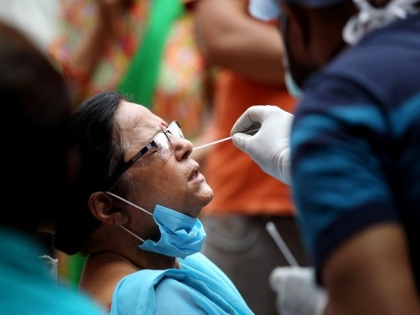Research data doesn't establish N440K variant is 'very virulent': Andhra COVID Command Centre chief
By ANI | Published: May 6, 2021 02:16 PM2021-05-06T14:16:36+5:302021-05-06T14:25:06+5:30
With various media reports claiming that the N440K variant prevailing in different parts of Andhra Pradesh is much more dangerous than the previous variants of COVID-19, the state government sent some samples to CCMB Hyderabad for testing and the results revealed that the data so far does not establish the claim.

Research data doesn't establish N440K variant is 'very virulent': Andhra COVID Command Centre chief
With various media reports claiming that the N440K variant prevailing in different parts of Andhra Pradesh is much more dangerous than the previous variants of COVID-19, the state government sent some samples to CCMB Hyderabad for testing and the results revealed that the data so far does not establish the claim.
In a clarification, Andhra Pradesh Covid Command Centre Chairman Dr KS Jawahar Reddy said: "On average around 250 samples are being sent to Centre for Cellular and Molecular Biology (CCMB) from the labs of the state every month, where genome sequencing of southern states -- Andhra Pradesh, Telangana and Karnataka -- are being carried out. The research data of CCMB far does not establish that N440K is a variant of interest and is very virulent."
N440K Strain of coronavirus (B136) was detected in the month of June-July last year from the samples of south India (Andhra Pradesh, Karnataka and Telangana). This strain was prevalent in December 2020 and January and February 2021 and dropped down drastically in March and now the share of N440K among the positives is very minimal.
At present, B1617 and B1 are the major strains identified from the samples of south India from the positives of the April month data, which is very infectious and is also spreading in the younger age groups apart from the adults.
B1617, and the 'double mutant' -- this name comes from two notable mutations found in other variants that appeared together for the first time in this new strain and first detected in western parts of India, the letter stated.
"Although, N440K variant shown to be efficient in cell culture system in experimental conditions, it is important to remember that just because a variant behaves a certain way in cell cultures (with no competition, and in controlled settings), it does not mean it will behave the same way in humans, or in a complicated pandemic scenario. N440K story is one such example."
"It is pertinent to note that COVID-19 Weekly Epidemiological Update dated April 25 issued by WHO mentions about lineage B1617 as VOI (Variant of Interest)from India and does not mention about variant N440K. If this variant is of such public health concern as reported in certain sections of media, it should have by now found place WHO reports as well as ICMR reports, it added.
"Hence it is clarified that research data so far does not establish that N440K is variant of interest and is very virulent," Chairman Reddy said.
Meanwhile, the health department of the state appealed to the media to be "responsible" in publishing material pertaining to scientific issues and avoid creating panic in the minds of public during this pandemic.
( With inputs from ANI )
Disclaimer: This post has been auto-published from an agency feed without any modifications to the text and has not been reviewed by an editor
Open in app